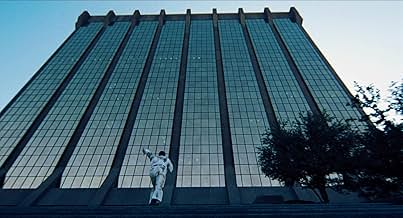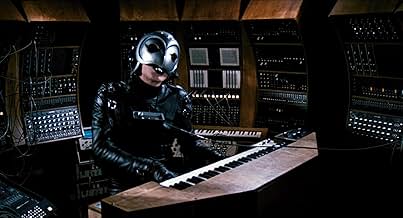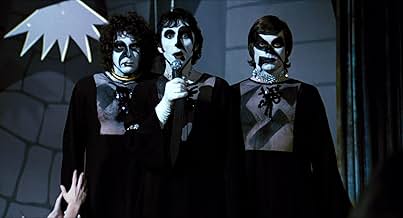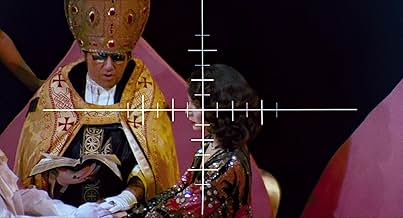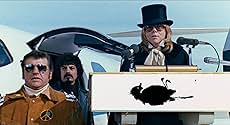A disfigured composer sells his soul for the woman he loves so that she will perform his music. However, an evil record tycoon betrays him and steals his music to open his rock palace, The P... Read allA disfigured composer sells his soul for the woman he loves so that she will perform his music. However, an evil record tycoon betrays him and steals his music to open his rock palace, The Paradise.A disfigured composer sells his soul for the woman he loves so that she will perform his music. However, an evil record tycoon betrays him and steals his music to open his rock palace, The Paradise.
- Nominated for 1 Oscar
- 3 wins & 5 nominations total
- The Juicy Fruits
- (as Harold Oblong)
- …
- Director
- Writers
- All cast & crew
- Production, box office & more at IMDbPro
Storyline
Did you know
- TriviaThe record press in which the character Winslow Leach is disfigured was in fact a real pressing plant (it was an injection-molding press at an Ideal Toy Company plant). William Finley was worried about whether the machine would be safe, and the crew assured him it was. The press was fitted with foam pads (which resemble the casting molds in the press) and there were chocks put in the center to stop it from closing completely. However, the machine was powerful enough to crush the chocks that it gradually kept closing. It is commonly believed that Finley pulled his head out of the press just in time to avoid being injured, and that his scream in that scene was genuine, but this is an exaggeration. Finley was quickly pulled out by grips and the record press scene, along with most scenes in the movie with little dialogue, was filmed without sound, and the talking and sound effects were dubbed in later. At a Phantom of the Paradise convention, Finley exaggerated the story and said that his scream was "for real", although he may have meant that he was able to conjure up a very real scream in post-production by thinking back to his memories of the incident.
- GoofsVideotape was still only in the experimental development phase in 1953, when Swan records his suicide note/contract, and at that it was only capable of black and white images. Color, broadcast quality videotape of the kind depicted here was not available until the late 1950s.
- Quotes
The Phantom: [to Beef] Never sing my music again. Not here, not anywhere. Do you understand? Never again. My music is for Phoenix. Only she can sing it. Anyone else who tries, dies!
- Crazy creditsThe closing credits feature a series of montages of the cast members, identifying each by name, starting with the musical trio (Oblong, Hahn, Comanor) and concluding with William Finley as Winslow/The Phantom. These montages are made up of shots ostensibly from the movie, and most of them are, but there are also numerous outtakes.
- Alternate versionsIn the pre-release (or press) prints of the movie, the scene where Winslow was disfigured by the record press was longer; His disfigured face was briefly seen steaming with smoke from the press, and Winslow then killed the cop that surprised him (and shot him in the leg, which explained why Winslow walked with a limp for most of the film; however, he was able to run with the greatest of ease towards the end). The scene was removed from subsequent versions, as it was best decided that Winslow's disfigured visage be revealed at the end of the film.
- ConnectionsFeatured in Terror in the Aisles (1984)
- SoundtracksGoodbye, Eddie, Goodbye
Written by Paul Williams
Performed by Jeffrey Comanor, Archie Hahn and Peter Elbling as The Juicy Fruits, lead vocal Archie Hahn
Swan (Paul Williams) is a powerful and legendary music producer who is making preparations for his greatest triumph in music business: The Paradise, a monster auditorium that will serve him as palace. To inaugurate his palace, he is looking for the perfect sound and he fins it in the music of Winslow Leach (William Finley), a young composer who dreams with presenting his "Faust" cantata to the world. Swan steals Leach's work and in an accident, deforms his face turning Leach into The Phantom. Now, as the masked monster, the Phantom will try to stop Swan's plans by sabotaging the Paradise.
The movie is a visually and musically impressive rock opera with a healthy dose of horror and tongue-in-cheek humor. Brian De Palma cleverly conjures the basic outline of Leroux's novel and add elements of his other influences making the movie a subtle yet moving tribute to the books/movies/music he loves. The modernization and the change from opera to rock work surprisingly good and despite of being a bit outdated by now, the music (by Paul Williams) still makes one of the best soundtracks in a horror film.
De Palma continues improving his technique in this film and like in the previous "Sisters", his style shows maturity and a definitive trademark. Often labeled as a Hitchcock-imitator, I believe that De Palma simply likes to pay constant tribute to his influences, and this film serves a proof of that. Elements of Welles, Hitchcock, Murneau, Whale and Wienne are all over the picture, yet "Phantom of the Paradise" is like none of the works of those directors.
Paul Williams not only composed the soundtrack, he also stars as Swan, the dark and evil genius that leads Death Records and ultimately uses Leach's music for his own purposes. His performance is superb and while not physically imposing he is truly one of the best villains I've ever seen. Finley's take on the Phantom is, like most of the modern interpretations of the character, a romantic tragic figure; but Finley recovers some of the original horror characteristics of the novel creating an attractive but still menacing monster.
Jessica Harper, who would achieve fame in Dario Argento's "Suspiria", gives a good performance as Phoenix, the young singer that captures both Swan and Leach's attention. Like she would do in "Suspiria", she adds depth to the role of the naive singer who wants nothing but to triumph. Something remarkable is the fact that she sang all her songs and did it with credibility and talent. Last but not least, Gerrit Graham portrays a Bowie-inspired Glam rock diva in the unforgettable role of rock superstar Beef.
Sadly, not everything is perfect in Paradise, and neither is in this movie. The odd mixture of musical and horror works very good but at times the movie gets a bit too serious to pass as a musical or too silly to pass as a horror film. It's not a surprise that "The Rocky Horror Picture Show" gained more recognition as it keeps both genres perfectly in equilibrium in all its flamboyant runtime. Still, this is a minor flaw that keeps the movie away from perfection.
Maybe I had low expectations or maybe I was just in the right mood, but "Phantom of the Paradise" was a pleasant surprise that I would not hesitate to recommend to fans of "The Rocky Horror Picture Show" or fans of black comedy in general. 8/10
- How long is Phantom of the Paradise?Powered by Alexa
Details
- Release date
- Country of origin
- Language
- Also known as
- Un fantasma en el paraíso
- Filming locations
- Production companies
- See more company credits at IMDbPro
Box office
- Budget
- $1,300,000 (estimated)
- Gross worldwide
- $2,245
- Runtime1 hour 31 minutes
- Color
- Aspect ratio
- 1.85 : 1
Contribute to this page



